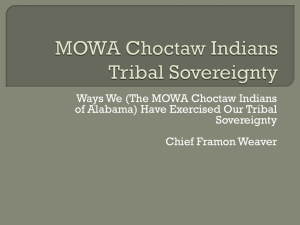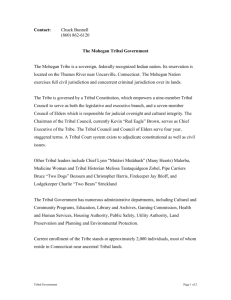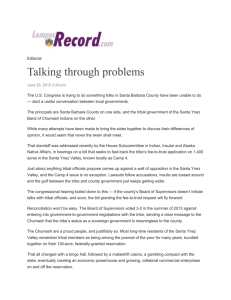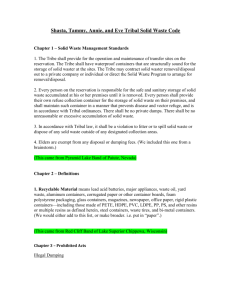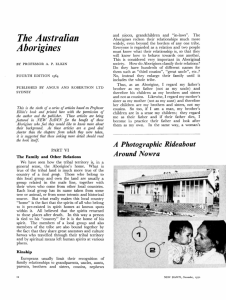Slip & Fall Injuries at Indian Casinos
advertisement
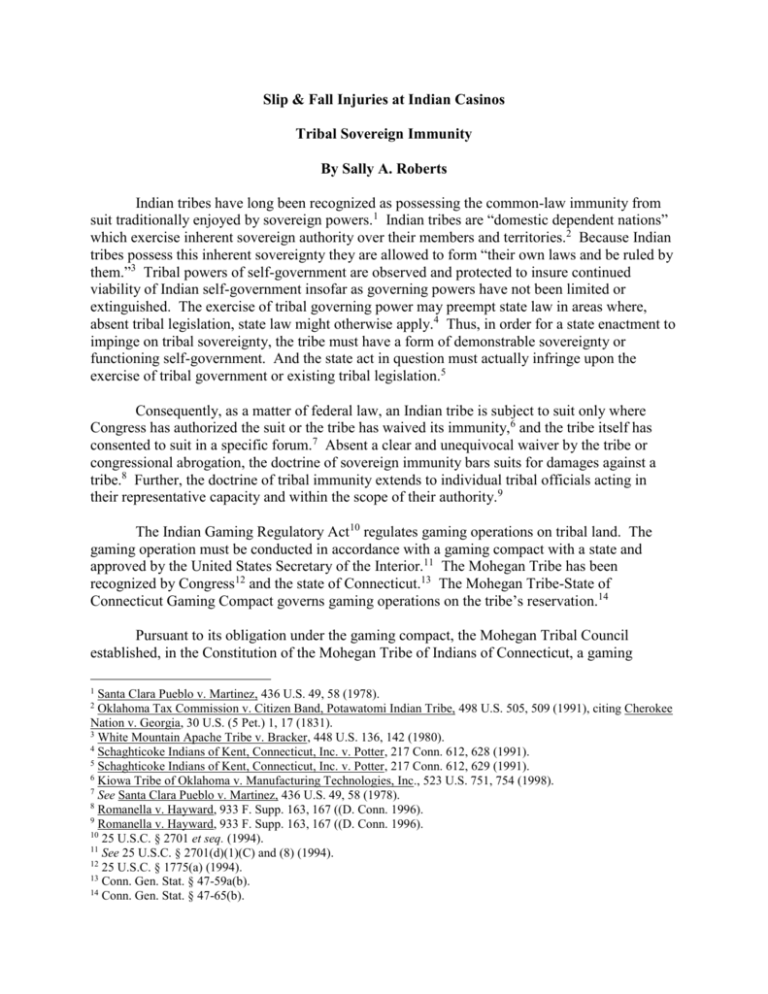
Slip & Fall Injuries at Indian Casinos Tribal Sovereign Immunity By Sally A. Roberts Indian tribes have long been recognized as possessing the common-law immunity from suit traditionally enjoyed by sovereign powers.1 Indian tribes are “domestic dependent nations” which exercise inherent sovereign authority over their members and territories.2 Because Indian tribes possess this inherent sovereignty they are allowed to form “their own laws and be ruled by them.”3 Tribal powers of self-government are observed and protected to insure continued viability of Indian self-government insofar as governing powers have not been limited or extinguished. The exercise of tribal governing power may preempt state law in areas where, absent tribal legislation, state law might otherwise apply.4 Thus, in order for a state enactment to impinge on tribal sovereignty, the tribe must have a form of demonstrable sovereignty or functioning self-government. And the state act in question must actually infringe upon the exercise of tribal government or existing tribal legislation.5 Consequently, as a matter of federal law, an Indian tribe is subject to suit only where Congress has authorized the suit or the tribe has waived its immunity,6 and the tribe itself has consented to suit in a specific forum.7 Absent a clear and unequivocal waiver by the tribe or congressional abrogation, the doctrine of sovereign immunity bars suits for damages against a tribe.8 Further, the doctrine of tribal immunity extends to individual tribal officials acting in their representative capacity and within the scope of their authority.9 The Indian Gaming Regulatory Act10 regulates gaming operations on tribal land. The gaming operation must be conducted in accordance with a gaming compact with a state and approved by the United States Secretary of the Interior.11 The Mohegan Tribe has been recognized by Congress12 and the state of Connecticut.13 The Mohegan Tribe-State of Connecticut Gaming Compact governs gaming operations on the tribe’s reservation.14 Pursuant to its obligation under the gaming compact, the Mohegan Tribal Council established, in the Constitution of the Mohegan Tribe of Indians of Connecticut, a gaming 1 Santa Clara Pueblo v. Martinez, 436 U.S. 49, 58 (1978). Oklahoma Tax Commission v. Citizen Band, Potawatomi Indian Tribe, 498 U.S. 505, 509 (1991), citing Cherokee Nation v. Georgia, 30 U.S. (5 Pet.) 1, 17 (1831). 3 White Mountain Apache Tribe v. Bracker, 448 U.S. 136, 142 (1980). 4 Schaghticoke Indians of Kent, Connecticut, Inc. v. Potter, 217 Conn. 612, 628 (1991). 5 Schaghticoke Indians of Kent, Connecticut, Inc. v. Potter, 217 Conn. 612, 629 (1991). 6 Kiowa Tribe of Oklahoma v. Manufacturing Technologies, Inc., 523 U.S. 751, 754 (1998). 7 See Santa Clara Pueblo v. Martinez, 436 U.S. 49, 58 (1978). 8 Romanella v. Hayward, 933 F. Supp. 163, 167 ((D. Conn. 1996). 9 Romanella v. Hayward, 933 F. Supp. 163, 167 ((D. Conn. 1996). 10 25 U.S.C. § 2701 et seq. (1994). 11 See 25 U.S.C. § 2701(d)(1)(C) and (8) (1994). 12 25 U.S.C. § 1775(a) (1994). 13 Conn. Gen. Stat. § 47-59a(b). 14 Conn. Gen. Stat. § 47-65(b). 2 disputes court and a gaming disputes court of appeals.15 The Mohegan Tribe enacted an ordinance establishing the Mohegan Torts Code, which contains a limited waiver of the tribe’s sovereign immunity so that the gaming disputes court may adjudicate liability for (1) injuries proximately caused by the negligent acts of omissions of the Mohegan Tribal Gaming Authority; (2) injuries proximately caused by the condition of any property of the Mohegan Tribal Gaming Authority provided the claimant establishes that the property was in a dangerous condition; and (3) injuries caused by the negligent acts or omissions of tribal security officers arising out of the performance of their duties during the course and within the scope of their employment.16 The Mohegan Torts Code further provides that the ordinance does not immunize employees of the authority from individual liability, but that all disputes regarding employment that occur on the Mohegan Gaming Enterprise Site shall be heard only in the Gaming Disputes Court.17 In Kizis v. Morse Diesel International, 260 Conn. 46 (2002), the plaintiff brought a negligence action against eight defendants for injuries resulting from a fall at the Mohegan Sun Casino. Of the eight defendants, two individual defendants (the director of facilities operation employed by the Gaming Authority, and a building official employed by the tribe) moved to dismiss the action, asserting tribal sovereign immunity. The plaintiff claimed that while entering the Mohegan Sun Casino, she fell over negligently placed fieldstone in an entrance walkway. The Connecticut Supreme Court concluded that the trial court did not have subject matter jurisdiction over the action (as to the two tribal defendants, only), because the proper forum for relief was the Mohegan Gaming Disputes Court. The Mohegan Torts Code and the Mohegan Constitution provided a forum and mechanism to redress plaintiff’s injuries. The Court held the Mohegan Gaming Disputes Court was the exclusive forum for the adjudication and settlement of tort claims against the tribe and its employees because it was the forum in which the sovereign had consented to being sued.18 In Ellis v. Allied Snow Plowing, Removal & Sanding Services Corp., 81 Conn. App. 110 (2004), the plaintiff brought a negligence action against the defendant Allied Snow Plowing, Removal & Sanding Services Corporation, alleging that the defendant’s negligent failure to clear snow and ice from a tribally owned parking lot in Norwich had caused her to be injured when she fell while attempting to board a bus. The plaintiff was at the parking lot in the course of her employment as a bus driver for Entertainment Tours, Inc., a company engaged in bringing patrons to the tribe’s casino. The plaintiff’s original complaint contained a count alleging liability on the part of the defendant Mashantucket Pequot Tribal Nation, which count was dismissed on the ground of tribal sovereign immunity. The issue was whether the tribe’s sovereign immunity entitled a general contractor to claim sovereign immunity from state court jurisdiction to hear a tort claim arising out of the contractor’s alleged negligence in performing snow removal duties on tribally owned land. The trial court denied the defendant’s motion to dismiss, emphasizing that it was undisputed that (1) 15 Mohegan const. art. XIII, § 2. Mohegan Tribe Indians Conn. Ordinance NO. 98-1, § 3 (c). 17 Mohegan Tribe Indians Conn. Ordinance NO. 98-1, § 6. 18 Kizis v. Morse Diesel International, 260 Conn. 46, 58 (2002). 16 2 neither the plaintiff nor the defendant was a member of the tribe, (2) the parking lot, although on tribal land, was not on the reservation itself, and (3) the action was not against the tribe itself. Like the Mohegan Tribe described in Kizis, the Mashantucket Pequot Tribal Nation had established a tribal court with jurisdiction over actions founded upon a tort of the Tribe or its agents, servants, or employees acting within the scope of their employment.19 The defendant claimed that the Mashantucket Tribal Court had exclusive jurisdiction over the plaintiff’s tort action. The Ellis court, however, was not persuaded that Kizis stood for the proposition that a properly authorized tribal court with broad tribal authority unfailingly ousted the Connecticut Superior Court of jurisdiction to hear any case that is in any way related to tribal activities. Strate v. A-1 Construction, 520 U.S. 438 (1997) is instructive. In Strate, the issue was whether a non-member of a tribe was entitled to pursue, in federal court, a personal injury claim arising out of a collision between her automobile and a truck driven by a non-member employee of a non-member general contractor engaged in performing landscaping services for the tribe.20 The United States Supreme Court held that the District Court, rather than the tribal court, had jurisdiction to hear the case. It concluded that tribes generally lack civil authority over the tortuous conduct of non-members of the tribe, unless the underlying activity directly affected the tribe’s political integrity, economic security, health or welfare. A “run of the mill” highway accident, the Court held, did not manifest such adverse impact.21 The Ellis Court concluded that the tribal court did not have exclusive jurisdiction to adjudicate the “run of the mill” slip and fall accident.22 Although the plaintiff might have pursued her claim in the tribal court, she was not obligated to do so. In the tribal court, the plaintiff would not have been entitled to a jury trial and would have had only a limited right to receive damages for pain and suffering.23 19 Mashantucket Pequot Tribal Laws, tit. XII, c. 1, § 2(a). Strate v. A-1 Construction, 520 U.S. 438, 443 (1997). 21 Strate v. A-1 Construction, 520 U.S. 438, 457 (1997). 22 Ellis v. Allied Snow Plowing, Removal & Sanding Services Corp., 81 Conn. App. 110, 115 (2004. 23 Mashantucket Pequot Tribal Laws, tit. XII, c. 1, § 2(b)(4). 20 3
